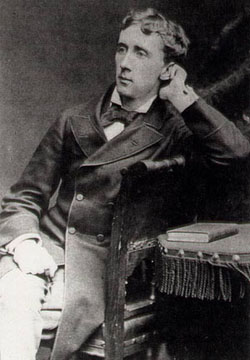|
|
|
|
|
|
|
|
![]()
 |
Sixth Son of Charles Dickens
1849-1933
"Looking back now upon the years that are gone, I find that there are one or two scenes or incidents which arise with astonishing vividness to my mind that may be worth recording...I hope it will not be thought that I tell this story vaingloriously, as it was but a small matter so far as I was concerned. Nothing is farther from my thoughts. I do so because it is typical of a strange reticence on [my father's] part, an intense dislike of 'letting himself go' in private life or of using language which might be deemed strained or over-effusive; though, as will be seen later, when he was deeply moved he was at no pains to hide the depth of his emotion. Thus it came about that, though his children knew he was devotedly attached to them, there was still a kind of reserve on his part which seemed occasionally to come as a cloud between us and which I never quite understood.
"In the year 1869, after I had been at college about a year, I was fortunate enough to gain one of the principal scholarships at Trinity Hall, Cambridge -- not a great thing, only 50 pounds a year; but I knew that this success, slight as it was, would give him intense pleasure, so I went to meet him at Higham Station upon his arrival from London to tell him of it. As he got out of the train I told him the news. He said, 'Capital! capital!' -- nothing more. Disappointed to find that he received the news apparently so lightly, I took my seat beside him in the pony carriage he was driving. Nothing more happened until we had got half-way to Gad's Hill, when he broke down completely. Turning towards me with tears in his eyes and giving me a warm grip of the hand, he said, 'God bless you, my boy; God bless you!' That pressure of the hand I can feel now as distinctly as I felt it then, and it will remain as strong and real until the day of my death."
From Memories of My Father,by Sir Henry Fielding Dickens.